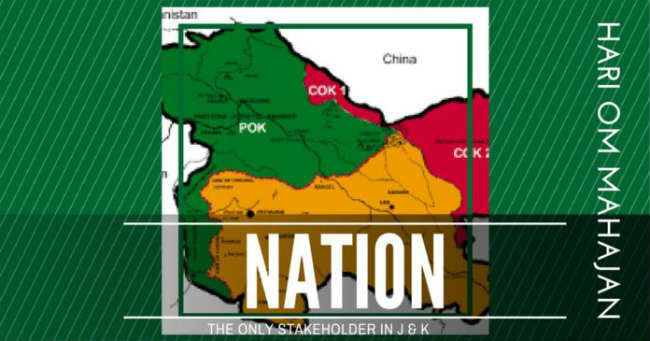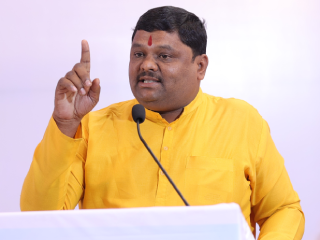By Prof. Hari Om Mahajan

India is a sovereign state and not a banana republic. It has its own territory, people, army, and government. Article 1 of the Indian Constitution defines the territories of India. It — in unequivocal terms — says that no government in the country could alter the political map of India. Under this Article, India can acquire additional territory, but cannot cede an inch of Indian land to any other country. The First Schedule of the Constitution contains the names of the states which form the Union of India and Jammu & Kashmir is placed at number 15 in the list of the states.
Jammu & Kashmir is the solitary State in the India Union which has a separate constitution under the (highly contested) Article 370 of the Indian Constitution. But it, like the Indian Constitution, also says that Jammu & Kashmir is an integral part of India and its political status can’t be altered.
Article 19 of the Indian Constitution gives unbridled freedom to all Indians to “move freely” across the country and “settle in any part of the territory of India”. It, in addition, gives all citizens the right to speech, assembly, and association. At the same time, it lays down conditions that nothing shall be done which even remotely challenges the sovereignty of the nation and undermines its territorial integrity. Those who challenge the sovereignty of the country and seek to undermine its territorial integrity are considered seditionists and the Indian Penal Code/ Indian Criminal Procedure Code and Jammu & Kashmir Ranbir Dand Bidhi (Ranbir Penal Code) contain definite laws which bring to justice elements hostile to the country.
The whole truth is that Article 1 and Article 19 form part of the basic structure of the Indian Constitution and cannot be tinkered with.
Jammu & Kashmir is the solitary State in the India Union which has a separate constitution under the (highly contested) Article 370 of the Indian Constitution. But it, like the Indian Constitution, also says that Jammu & Kashmir is an integral part of India and its political status can’t be altered. Section 3 of the Jammu & Kashmir Constitution, which was adopted by the Jammu & Kashmir Constituent Assembly in November 1956 and enforced on January 26, 1957, unambiguously defines the political status of the State vis-à-vis India. It says that “the State of Jammu & Kashmir is and shall be an integral part of the Union of India”. It also says that “the territory of the State shall comprise the territories which on the fifteenth day of August 1947 were under the sovereignty or Suzerainty of the Ruler of the State”.
The fact of the matter is that the Constitution of India and the Jammu & Kashmir Constitution, unlike the erstwhile Constitution of Soviet Union, do not give the right to any part of the country or any section of the population to secede from India under any condition whatsoever. The Jammu & Kashmir Constitution is not sovereign; it is subordinate to the Indian Constitution. The Supreme Court in its landmark judgment on December 16, 2016, said that Jammu & Kashmir had no vestige of sovereignty outside the Constitution of India.
The operative part of the judgment, which was delivered by the Supreme Court Bench consisting of Justice Kurian Joseph and RF Nariman, read like this: “It is thus clear that the State of Jammu & Kashmir has no vestige of sovereignty outside the Constitution of India and its own Constitution, which is subordinate to the Constitution of India, it is therefore wholly incorrect to describe it as being sovereign in the sense of its residents constituting a separate and distinct class in themselves. The residents of Jammu & Kashmir are first and foremost citizens of India”.
The apex court gave this historic verdict while upturning the judgment of the Jammu & Kashmir High Court on the Securitisation and Reconstruction of Financial Assets and Enforcement of Security Interests Act (SARFAESI Act). The Jammu & Kashmir High Court had ruled that the SARFAESI Act could not be made applicable to the State as it was a Central Law and that Jammu & Kashmir State was sovereign. The Supreme Court verdict was unambiguous: Indian Constitution is supreme and Jammu & Kashmir State could not have a regime that was outside it.
The point is that the Constitution of India represents the will of the nation and, hence, the nation is the only stakeholder in Jammu & Kashmir like in other States and Union Territories of the Indian Union. Of course, people are stakeholders, but in matters relating to governance, administration, development, jobs, education, healthcare, election system and so on and so forth. They have the natural right to comment on the functioning of the government, fight for their fundamental rights and even demand the dismissal of the government if it, in their opinion, is unfit to govern, or has failed to deliver. They can also demand the creation of new states, as the Indian Constitution provides for the creation of new states. It was the people’s movement that Punjab was trifurcated into Punjab, Himachal Pradesh and Haryana and Bihar, Uttar Pradesh and Andhra Pradesh were bifurcated to meet the genuine needs of the people despite stiff opposition from some influential quarters.
Unfortunately, we have in our country certain politicians, commentators and so-called trouble-shooters and conflict-managers who term the separatists in Kashmir as “stakeholders” and repeatedly urged the Union Government to talk to them to resolve the otherwise non-existent Kashmir issue. Thus, they negate the very cardinal principles of the State and the Sovereignty. The worst part of the whole situation is that even a national party like the BJP uses the term “stakeholders” again and again while reflecting on the Jammu & Kashmir situation. In fact, the People’s Democratic Party (PDP) and the Bharatiya Janata Party (BJP) talks about stakeholders in their March 1, 2015, Agenda of Alliance (AoA).
It would be prudent to quote verbatim from it the relevant portion. It reads: “The earlier NDA Government led by Shri Atal Bihari Vajpayee had initiated a dialogue process with all political groups, including Hurriyat Conference, in the spirit of ‘Insaniyat, Kashmiriyat, and Jamhooriyat’. Following the same principles, the coalition government will facilitate and help initiate a sustained and meaningful dialogue with all stakeholders, which will include all political groups, irrespective of their ideological views and predilections. This dialogue will seek to build a broad-based consensus on the resolution of all outstanding issues of Jammu & Kashmir”.
Even a superficial look at these lines will be enough for a naïve to conclude that AoA doesn’t consider Jammu & Kashmir an integral part of India and that its political future is yet to be determined. Here lies the whole problem. All Kashmiri parties and separatists – apart from parties like the Congress, the CPI and the CPI-M – are accusing the BJP-led NDA Government of going back on its written commitment and urging it again and again to start talks with “all stakeholders’ in Kashmir to resolve the “70-year-old Kashmir problem”.
Sad that elements in the Indian political class have right from the beginning of freedom of India relied on conceptual constructs which are self-contradictory, illogical, unscientific and destructive in mature. Meaningless concepts such as “composite dialogue”, “stakeholders”, “back channel diplomacy”, “peace process”, “neighbours cannot be changed’, “South Asian Peace Zone” and so on have been fabricated by such elements because they have never picked up the courage to face the growth of Islamic jihad in Kashmir and because they never built the determination to fight it.
Of course, there are territories of Jammu & Kashmir, which have been under the illegal occupation of Pakistan since October 1947. It is for New Delhi to take the required steps to retrieve those territories as the February 1994 unanimous parliamentary resolution.
Indian political class would do well to revise their whole approach towards Jammu & Kashmir and stop using such unsettling terms as stakeholders. It must remember that the Kashmiri separatists and the so-called mainstream parties like the PDP and the National Conference have been working for another communal partition of India and for a regime that is virtually outside the political and constitutional organization of India. Demands in Kashmir for independence or self-rule or greater autonomy are all divisive and any of these demands, if accepted, would lead to similar demands in other states. The only course left before the Union Government is the removal from the Indian statute book provisions like Article 370 and Article 35-A, which have widened the gulf between Jammu & Kashmir and rest of the country. In other words, the Union Government has to implement its own “One Nation, One Law” doctrine in the State like it did in the case of the Goods and Service Tax despite opposition from Kashmir.
Source : PGurus





